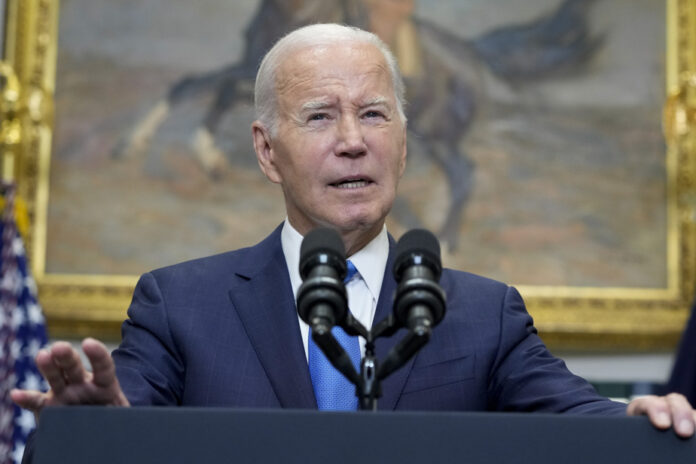(Wayne) The unprecedented strike hitting the three major American auto manufacturers for less than 24 hours led to the first collateral consequences on Friday, while President Joe Biden pleaded for a “fair” sharing of their “record profits”.
The Ford group has announced the temporary dismissal of around 600 employees from its Wayne (Michigan) plant due to lack of activity. They will not be entitled to unemployment benefits.
According to the manufacturer, “the strike in the assembly and painting part” affects employees in non-striking sectors who cannot accomplish their tasks due to lack of equipment. “Our production system is highly interconnected,” he explained.
This factory is one of three sites affected by a work stoppage launched overnight from Thursday to Friday.
It targets the “Big Three”, the “Big Three” American manufacturers – General Motors (GM), Ford and Stellantis (resulting from the merger of the French PSA and the American Chrysler).
Despite two months of negotiations, they did not reach an agreement with the powerful auto union, the United Auto Workers (UAW) on new collective agreements before the deadline Thursday evening.
“Companies have made significant proposals, but I think they should go further” with employees, President Joe Biden said on Friday.
UAW boss Shawn Fain showed willingness on Friday afternoon to continue negotiations.
“Today we bring our members together. Tomorrow we will be at the negotiating table,” he said, saying all three groups had now received a “full counter-offer.”
Joe Biden, who is seeking a second term at the White House in 2024, regularly shows his support for unions in all sectors.
“No one wants a strike,” he said, but assured that he understood “the frustration of workers,” who “deserve a fair share of the benefits they helped create.”
In the first half of 2023, the three manufacturers generated cumulative revenue of $276 billion and net profit of $20.25 billion.
The walkout began Friday at three assembly plants: the Ford site in Wayne, as well as those of GM in Wentzville, Missouri, and Stellantis in Toledo, Ohio. About 12,700 employees were expected to walk out Friday, according to the union.
“I think the strike will last at least a month or two,” Sofus Nielson, a Ford employee for 29 years, including fifteen at the Wayne plant, commented to AFP on Friday, saying he was “worried about the young workers » who have lower salary scales and benefits.
For Jillian Gray, employed at the same site for sixteen years, “it’s about time. We need that to keep up with the economy, […] to be able to buy what we make.”
The movement could spread. Shawn Fain urged the approximately 146,000 members of his organization working for these manufacturers to be ready to strike.
The last strike in the sector dates back to 2019 and only affected GM, for six weeks.
Joe Biden could be penalized by a prolonged or widened social conflict, which risks weighing on growth. Its economic record is regularly criticized by Republicans, in particular due to stubborn inflation.
According to the consulting firm Anderson Economic Group (AEG), whose clients include Ford and GM, a ten-day strike by all UAW union members could represent more than five billion dollars in lost revenue for the economy. American.
The UAW is demanding a wage increase of some 40% over four years, while the three manufacturers have not gone beyond 20%, according to the union.
The giants have also notably refused to grant additional days of leave and to increase pensions, paid by funds specific to each company.
In a statement, Ford said Thursday evening that it was “absolutely committed to reaching an agreement that rewards employees and protects (its ability) to invest for the future.”
Interviewed on CNN Friday, GM boss Mary Barra defended the automakers’ proposals, which include “not only a 20% increase in gross pay, but also profit sharing, world-class health coverage and several other features “.
Stellantis said it was “extremely disappointed by the refusal of UAW leadership to responsibly engage in reaching a fair agreement in the best interests of our employees, their families and our customers.”
For Garrett Nelson, CFRA analyst, companies “are flush with cash and […] can arguably withstand a strike longer than employees.”















